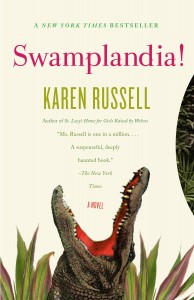 I first heard of Karen Russell’s Swamplandia! in 2012, when it was announced as a finalist for that year’s Pulitzer Prize, alongside David Foster Wallace’s The Pale King. Inexplicably, and perhaps also inexcusably, no prize was awarded that year, but the buzz generated by the nomination was enough to mark Russell as a young writer (she’s only 32) worth following. Swamplandia! is her debut novel, born from a short story she had published some five years earlier.
I first heard of Karen Russell’s Swamplandia! in 2012, when it was announced as a finalist for that year’s Pulitzer Prize, alongside David Foster Wallace’s The Pale King. Inexplicably, and perhaps also inexcusably, no prize was awarded that year, but the buzz generated by the nomination was enough to mark Russell as a young writer (she’s only 32) worth following. Swamplandia! is her debut novel, born from a short story she had published some five years earlier.
The novel tells the story of the Bigtrees, a family of alligator wrestlers whose amusement park located in a Florida swamp falls into decline when Hilola, the mother of the family and star of the park’s “Swimming with the Seths” (“Seths” being the family’s pet name for alligators) act, contracts cancer and dies. The remaining family members – Chief Bigtree, the father; Kiwi, the eldest brother; Osceola, the middle child; Ava, the youngest – each cope with the loss in different ways, repressing their pain in order to keep the park out of bankruptcy.
The book alternates between the narration of 13-year-old Ava and her 17-year-old brother Kiwi, and Russell does a masterful job forcing us to see the world, our world, through their eyes. Having grown up in the swamp, the Bigtree children have little contact with “mainlanders,” and when Kiwi runs off to find a job and help chip away at the family debt, his innocence and inexperience contrasts painfully with the cynical world-weariness of his fellow teenagers. Ava boasts of her own precociousness and maturity – she wrestles alligators, after all! – but she is similarly innocent, and much of the book’s surrealism comes from her willingness to entertain the possibility of spirits, ghosts and an underworld, despite her skeptical nature. The painful subtext, so skillfully drawn by Russell, is that this willingness to believe comes from the wish to see her mother again, in any form.
Russell writes with preternatural, envy-inducing skill, particularly with regard to metaphor (a character’s neediness “was like a fire that ate all the oxygen in a room”), and her characters, however minor, never feel artificial, but the narrative buckles somewhat under the weight of her ambition, with much of the book’s final chapters feeling rushed. Still, as a first effort, Swamplandia! is immensely enjoyable and reveals Russell to be one of America’s most promising young writers.